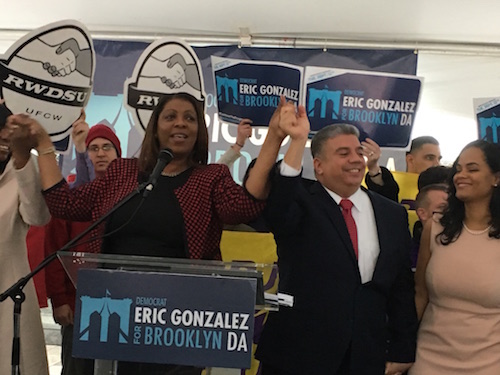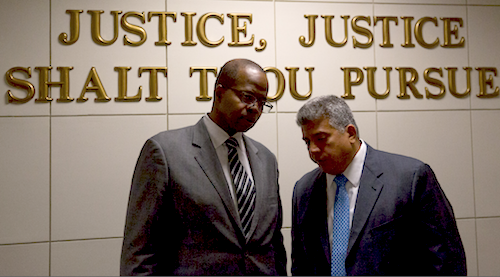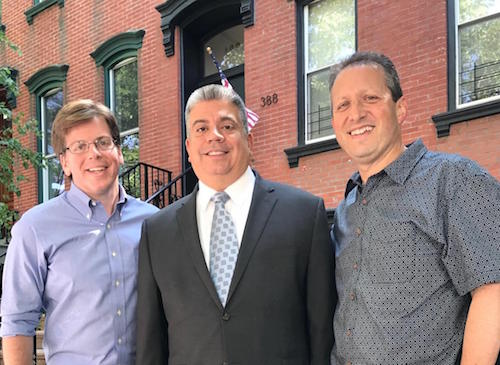Acting Kings County District Attorney Eric Gonzalez and I were sitting at a booth table in the Marriott Hotel restaurant on Adams Street in Downtown Brooklyn just around the corner from the DA’s office on Jay Street. It was the lull between the breakfast and lunch hour. The clatter of restaurant workers readying for the afternoon rush only occasionally bit into the humming sound coming from the refrigerated soft drink shelves.
“I’ve been thinking about the issues of criminal justice since high school. I mean East New York was the homicide capital of New York City at the time, and yet there was so much resentment towards law enforcement from so many segments. It didn’t really make a lot of sense,” said Gonzalez, who grew up in Williamsburg and East New York. “I witnessed in the 80s many of my friends become victims to crimes. I also saw many of them get involved in the drug business, because there was a lack of other opportunities, and then I saw how their lives were ruined.”

Gonzales recalled he was never a perfect child and particularly in middle school, had a few scrapes when some in the neighborhood tried to take his sneakers and coat, but he was lucky to have never gotten involved on the wrong side of the criminal justice system. He was also fortunate in being a very strong test taker, and someone who always enjoyed school.
Although Gonzalez got into Brooklyn Tech for high school, he decided to go to John Dewy High School in Coney Island as it was a more integrated school and in a different part of the borough. It was here where he also became involved with Aspira, an organization involved in creating educational opportunities for young Puerto Rican and Latino youths.
“Aspira took a lot of interest in me and put me into the young leadership program and that young leadership program taught me and trained me to think that I was going to be successful. That I was going to go to college and get a good education, and that I was probably going to become a professional and that I had to give back to the community. This started me thinking how I would give back. And at the time the most pressing thing in my life was crime all around East New York every day,” said Gonzalez.
“I tell this story that when I would walk down Pennsylvania Avenue to catch the train to go to Dewy I would kick crack vials up the street. It was that prevalent. I would get up super early. I had a job before school at a deli across the street from the hIgh school so I had to leave my house at five in the morning to get to Dewey so I could be there to butter the bagels,” he added.
Gonzalez said he originally planned on entering the military after high school like many on both his mom and dads side of the family, but with Aspira’s help and guidance, along with his own perseverance and tenacity, he got into Cornell University, and after law school, began his legal career in 1995, as an assistant district attorney in the Kings County District Attorney’s Office, thereby fulfilling his ambition to give back to his community.
Gonzalez spent several years, first as a junior and then senior assistant in different bureaus within the office, including the Sex Crimes and Special Victims Bureau and Domestic Violence Bureau. He also regularly liaised with community members and precinct commanders as part of a “community prosecution” approach to law enforcement.

Shortly after the late District Attorney Ken Thompson took office in 2014, Gonzalez was promoted to Counsel to the District Attorney, the first Latino to hold that position in Brooklyn. The two prosecutors then successfully launched several of Thompson’s key initiatives, including the creation of the Conviction Review Unit and the office changing policy regarding the possession of marijuana, which Gonzalez framed and implemented. The two also found in each other a kindred spirit.
“I think ultimately what really bonded us was we had a lot in common. Our children are about the same age. We both come from similar backgrounds. He was black, I was Puerto Rican. We shared very similar life experiences growing up in New York City. He grew up in [public] housing, I grew up in a very poor neighborhood. We both had a single mother for most of our lives and the temptation of what was out there in the streets in the 80s and 90s , It was similar. He’s a little older, but not by much, and we were both able to focus on school work and we wanted the same thing for our community,” recalled Gonzalez.
Just as important, both wanted Brooklyn to be safer, and stronger, but also needed the borough to be a fairer place. Having grown up as people of color in the city, they both experienced first-hand not only issues of public safety and how that impacts every aspect of everyone’s lives in these communities, but also the impact of not having good relationships between police and law enforcement and the community.
“Ken and I would talk about this late into the evening. About what we could do in the Brooklyn DA’s office to make sure Brooklyn was getting safer and fairer and part of that, was what we were doing internally but also it was making sure that the average person in Brooklyn had confidence in law enforcement,” recalled Gonzalez.
It was this trust and commonality in thinking of how to run the office that largely contributed to Thompson appointing Gonzalez the acting District Attorney last October just days before he died of cancer. And with his death, started the political scramble to replace him among a number of potential candidates, but Gonzalez said he needed to make sure all was well in the transition phase before deciding he would run for the office.
“We lost the head of the office and it wasn’t like we had a pre-existing team that had been there for 20 years. It was a young executive team. So I focussed my energy on making sure we did the work while also giving the existing DAs and people who work on staff time to mourn. We mourned and then I held a meeting and said, “Okay, now it’s time for us to get to work and continue to do the good work,'” said Gonzalez.
“And I’m very proud of the work that the office has done even since Ken has passed. We’ve done the largest gun bust in Brooklyn’s history. We’ve done three significant drug cases and all other types of cases that have kept people safe. And so I’m just very proud of the work and I think as we go through this campaign now, and people are looking at their options so far as other candidates, it’s clear that I could do this job and I did this job under the most stressful time when you had the leader of the organization suddenly die,” he added.
Gonzalez said this work includes not only carrying on Thompson’s groundbreaking criminal justice review board, but moving in his own direction in establishing a district attorney immigration unit, which serves to inform immigrants both documented and undocumented of their rights, as well as the establishment of the young adult court, which seeks possible alternatives to incarceration while still maintaining a strong measure of public safety.
While the hot button campaign issue is criminal justice reform, which Gonzalez champions, he notes that what makes this discussion even possible is the unprecedented lowering of violent crime statistics.
“Criminal justice reform is only possible because we’re doing so much better,” said Gonzalez. “I’m the only candidate that wants to talk about safety issues. In Brooklyn at the end of 2016, we had the second fewest homicides in Brooklyn’s history and the least number of shooting victims and shooting incidents. Now, we’re halfway through the year in 2017, and we’re down almost 25 percent in shooting victims and shooting incents are down almost 20 percent, and our homicides are down. So we can have the debate about the criminal justice system because of where we are at,” said Gonzalez.
Gonzalez said another side of the criminal justice equation is the victims, which have often not been mentioned with the other candidates in the race.
“When you talk about holding people accountable, I’m on the record as saying I don’t think our primary responsibility should be incarceration, That should be the last option. The first option is making sure people are truly accountable and admit what they’ve done wrong and to try to make amends with the victims in the ways that they can,” said Gonzalez.
“If you go back years ago, victims for the most part didn’t have a say in how their cases went forward, and there was a lot of dissatisfaction. We’ve piloted a few programs in the office that brings those who have done harm and brought victims together to make sure the victims have felt that the criminal justice system also worked for them. We can pay attention to the people who have been harmed and also make sure the criminal justice system is fairer for everyone. We can do both, and we have shown it in Brooklyn.”










